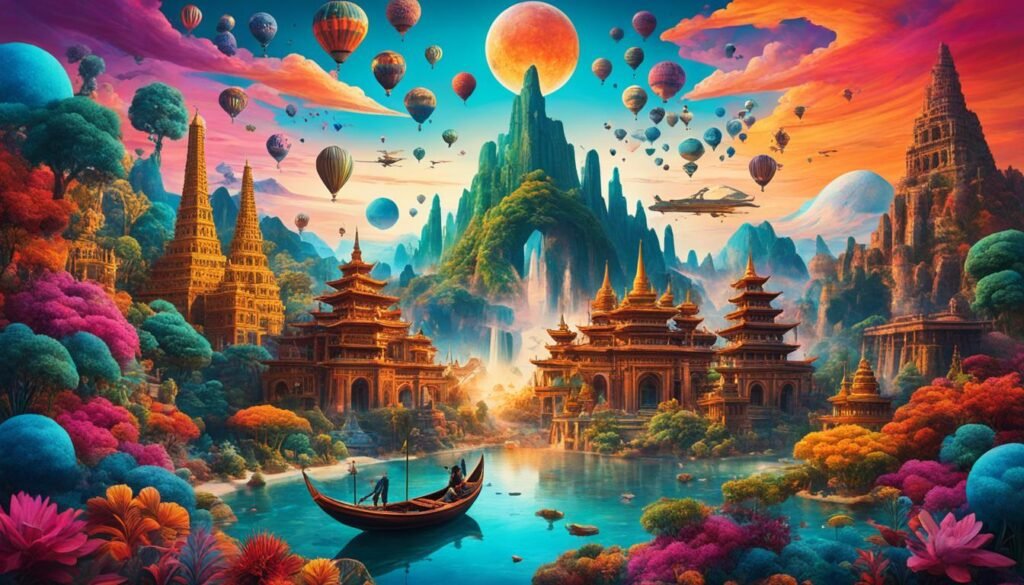Dreams are a fascinating aspect of human experience. They have been studied and interpreted throughout history, shaping our understanding of the subconscious mind and offering insights into our emotions, fears, and desires. However, what we may not realize is that the interpretation of dreams varies across different cultures around the world.
When it comes to dream interpretation, there are cultural differences that influence how dreams are understood and analyzed. Cultural beliefs, traditions, and social norms all play a role in shaping the way dreams are interpreted. In this article, we will explore the topic of dream interpretation from a global perspective, delving into cross-cultural dream analysis and the cultural perspectives on dream symbolism.
Key Takeaways:
- Cultural differences significantly impact the interpretation of dreams.
- Understanding cross-cultural dream analysis provides valuable insights into the human experience.
- Cultural perspectives shape the symbolism attributed to dreams in different societies.
- Dream interpretation varies based on cultural beliefs and social norms.
- Exploring global cultural variations in dream interpretation enhances cross-cultural communication.
Global Cultural Variations on Dream Symbolism
Dreams are influenced by the cultural beliefs and symbols that are prevalent in a particular society. Different cultures may assign different meanings to specific dream symbols, creating cultural variations in dream meanings. Understanding these cultural influences on dream symbolism can provide valuable insights into cross-cultural communication and the ways in which individuals from different cultures interpret and understand their dreams.
In some cultures, dreaming of certain animals may be seen as a positive sign, while in others it may be seen as negative. For example, in ancient Egyptian culture, dreaming of a cat was considered a positive symbol of protection, while in European folklore, a black cat in a dream was often associated with bad luck.
Similarly, flowers can have different symbolic meanings in different cultures. In Asian cultures, lotus flowers are often associated with purity and enlightenment, while in Western cultures, roses are commonly associated with love and romance.
These cultural variations in dream meanings highlight the importance of understanding the cultural context when interpreting dreams. By being aware of the cultural influences on dream symbolism, we can better appreciate the diversity of dream experiences and enhance our ability to connect with individuals from different cultural backgrounds.
Universal Dream Symbols Across Cultures
While there are cultural variations in dream symbolism, there are also universal dream symbols that can be found across different cultures. These symbols often tap into basic human emotions and experiences that transcend cultural boundaries.
- Water: Water symbolizes emotions and the subconscious mind in many cultures. Dreams featuring water may indicate the dreamer’s emotional state or represent the unknown and mysterious aspects of life.
- Death: Death, although a symbol of finality in waking life, often represents transformation and new beginnings in dreams. This symbol can be found in various cultures, reflecting the universal human fear and curiosity surrounding death.
- Flying: Dreams of flying are commonly associated with a sense of liberation and freedom. This symbolic theme can be found in cultures worldwide, representing a desire for transcendence and escape from limitations.
- Being chased: The fear of being chased is a common dream scenario that transcends cultural boundaries. It often symbolizes feelings of anxiety, pressure, or the need to confront and overcome challenges.
These universal dream symbols across cultures remind us of our shared human experiences and emotions. They serve as a reminder that although culture influences dream symbolism, there are underlying psychological and emotional themes that resonate with individuals across different cultural backgrounds.
Social Bonds and Dream Resolutions in Forager Communities
The dreams of forager communities, such as the BaYaka and Hadza, provide fascinating insights into the cultural diversity in dream analysis and the cultural aspects of dream interpretation. These communities often experience dreams that begin with threatening scenarios but end with a resolution that involves social support and community bonds.
This pattern highlights the deep-rooted importance of interpersonal relationships and social cohesion in forager societies. Through their dreams, individuals in these communities process the emotional content associated with potential threats and challenges they may face in their daily lives.
The dream resolutions that prioritize social connections and community support reflect the significance of maintaining strong bonds within these societies. Dreams serve as a subconscious mechanism for reinforcing social connections, promoting emotional well-being, and ensuring the survival of the group as a whole.
In exploring the cultural aspects of dream interpretation in forager communities, we gain a deeper understanding of the pivotal role that dreams play in these societies. Forager communities view dreams as a means to harmonize social relationships and navigate the complexities of daily life.


Understanding the cultural perspectives on the relationship between dream space and waking life provides valuable insights into how dreams are understood and interpreted across different cultures. It reveals the significance assigned to dreams and the role they play in shaping individuals’ perceptions of reality and their place in the world.
Dreams as Predictions of the Future
Many cultures believe that dreams can offer glimpses into the future, whether in a literal or metaphorical sense. Across different cultural perspectives on dream symbolism, dreams are often regarded as omens or messages from the spiritual realm, providing insight into upcoming events. The interpretation of dreams as predictions can vary greatly from culture to culture, with specific symbols and signs holding distinct meanings.
Examining the cultural aspects of dream interpretation and cross-cultural dream analysis allows us to gain valuable insights into how individuals navigate the uncertainties of their lives. Different cultures may assign unique interpretations to certain dreams, further enriching our understanding of the human experience and the diverse ways in which dreams are perceived around the world.
Understanding dreams as predictions of the future is fascinating from a cultural perspective. It reveals how societies attach significance to dreams and seek to uncover hidden meanings within them. By exploring the interpretations of dreams across cultures, we can better appreciate the role dreams play in shaping beliefs, guiding actions, and providing individuals with a sense of connection to the world around them.
Social Embeddedness of Dreams
Dreams are not just individual experiences; they are embedded within a social context. Telling and sharing dreams can be a significant social disclosure, fostering connections and creating shared experiences among individuals. However, there are often social rules and conventions surrounding when and how dreams can be shared.
In different cultures, the interpretation and understanding of dreams can also be influenced by social and cultural norms. Each society may have its own beliefs, rituals, and practices associated with dream analysis and interpretation. For instance, some cultures may view dreams as a personal spiritual journey, while others may interpret dreams as messages from ancestors or divine beings.
Moreover, dreams can contribute to one’s identity in certain cultures. They may serve as a reflection of personal experiences, beliefs, and aspirations, shaping an individual’s sense of self. In some cases, dreams can even hold political significance, symbolizing cultural or social messages related to power dynamics, social change, or collective consciousness.
Exploring the social embeddedness of dreams provides valuable insights into the ways in which dreams are not only shaped by individual experiences but also influenced by the cultural diversity and social dynamics of a particular society. It highlights the importance of considering cultural aspects of dream interpretation and the role of dreams in shaping social relationships and cultural identities.
Dream Sharing Norms in Different Cultures
- In some Native American cultures, dream sharing is considered a sacred practice that strengthens community bonds and fosters a deeper understanding of oneself and others.
- In Japanese culture, dreams are often viewed as private and personal experiences, and individuals may hesitate to share their dreams openly.
- In African cultures, dreams are sometimes shared in communal gatherings, allowing the community to collectively interpret and derive meaning from the dreams.
The social embeddedness of dreams highlights the significance of cultural diversity in dream analysis. It emphasizes that dreams are not only influenced by individual thoughts and experiences but also by the broader cultural and social contexts in which they occur.


Dream-based rituals are another means by which different cultures harness the therapeutic potential of dreams. These rituals often involve the use of symbolism and visualization techniques to tap into the transformative power of dreams. By reenacting dream narratives or embodying dream symbols, individuals can experience healing and gain a deeper understanding of themselves.
Cultural influences play a significant role in shaping the therapeutic use of dreams. Each culture has its own set of dream symbols, meanings, and practices that reflect its unique beliefs and values. By exploring these cultural variations, we can gain a broader understanding of the diverse ways in which dreams contribute to personal growth and psychological well-being.
The Therapeutic Power of Dream Interpretation
- Dream interpretation provides insights into hidden meanings and symbols within dreams.
- It promotes self-reflection and self-awareness.
- Individuals can uncover their subconscious conflicts, desires, and emotions through dream analysis.
Dream-Based Rituals for Healing and Transformation
- Cultural practices incorporate symbolic elements from dreams into rituals.
- Visualization techniques and reenactments are used to tap into the transformative power of dreams.
- Dream-based rituals facilitate healing, self-discovery, and personal growth.
By embracing the cultural aspects of dream interpretation and the therapeutic use of dreams, individuals can harness the power of their subconscious mind to promote emotional well-being and embark on a journey of self-discovery. Whether through dream analysis or engaging in dream-based rituals, dreams offer a rich source of insight and transformation for individuals across different cultures.
Conclusion
Dreams are a fascinating and complex aspect of human life that transcends cultural boundaries. However, cultural differences play a significant role in shaping the interpretation and meaning of dreams. From the forager communities in Tanzania and the Democratic Republic of Congo to Western societies, cultural beliefs, social norms, and environmental influences all contribute to the varied symbolism and interpretation of dreams.
By studying the cultural differences in dream symbolism and variations in dream meanings, researchers have gained valuable insights into how dreams reflect cultural values and social bonds. For example, in forager communities, dreams often emphasize the importance of social support and community connections in the face of threats and challenges. On the other hand, Western societies may interpret dream symbols differently based on their cultural backgrounds and societal influences.
Understanding the cultural influences on dream interpretation is crucial for fostering cross-cultural communication and empathy. It helps us appreciate the rich diversity of human experiences and the intricate ways in which culture shapes our understanding of dreams. Cultural sensitivity in dream analysis expands our knowledge of the human psyche, emotional well-being, and the intricate interplay between dreams and culture.
In conclusion, cultural differences in dream symbolism, variations in dream meanings, and cultural influences on dream interpretation provide deep insights into the multifaceted nature of dreams. Exploring the cultural aspects of dreams not only enhances our understanding of the human experience but also promotes cross-cultural understanding and empathy.
What Cultural Factors Influence Dream Interpretation?
Cultural factors play a significant role in the comparative analysis of dream theories. Different cultures have unique beliefs and interpretations about dreams, affecting how individuals view and analyze their dreams. Factors such as religion, folklore, and societal norms all contribute to shaping how dreams are understood within specific cultural contexts.

